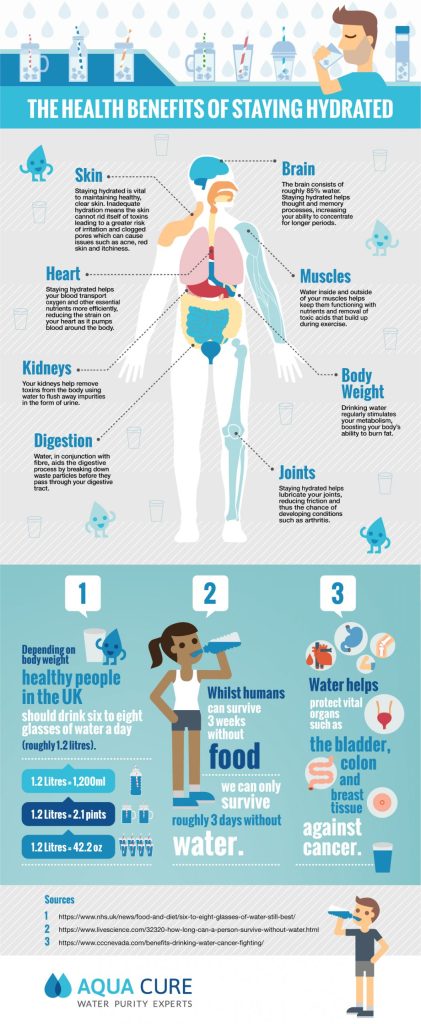Staying hydrated is crucial for maintaining optimal health and well-being. The importance of staying hydrated cannot be overstated, as water plays a vital role in nearly every bodily function. From regulating body temperature to aiding digestion and supporting cognitive function, proper hydration is essential for a healthy lifestyle. In this article, we will explore the various benefits of hydration, the signs of dehydration, and practical tips to ensure you are drinking enough water throughout the day.
As we delve deeper into the importance of staying hydrated, you will learn about the significant impact that hydration has on your physical performance and energy levels. Whether you are an athlete or someone who leads a busy lifestyle, understanding how hydration affects your body can help you make informed choices. Additionally, we will discuss the common myths surrounding hydration and clarify how much water you really need to consume daily.
Moreover, we will provide you with easy-to-implement strategies to incorporate more fluids into your daily routine, making hydration a seamless part of your life. From delicious infused water recipes to tips on tracking your intake, this article aims to equip you with the knowledge and tools necessary to prioritize your hydration. So, stay with us as we uncover the essential role that water plays in your health and how you can make staying hydrated a simple yet impactful habit.
The Role of Water in Bodily Functions
Water is essential for various bodily functions, including digestion, circulation, and temperature regulation. It acts as a solvent for nutrients, allowing them to be absorbed and transported throughout the body. Without adequate hydration, these processes can become inefficient, leading to a range of health issues.
Moreover, water plays a crucial role in maintaining electrolyte balance, which is vital for muscle function and nerve transmission. Dehydration can disrupt this balance, resulting in muscle cramps, fatigue, and even confusion. Therefore, understanding the importance of water in our daily lives is fundamental to maintaining overall health.
Signs and Symptoms of Dehydration
Recognizing the signs of dehydration is crucial for preventing more severe health problems. Common symptoms include thirst, dry mouth, fatigue, and dark-colored urine. In more severe cases, dehydration can lead to dizziness, rapid heartbeat, and confusion.
It’s important to note that some individuals, such as the elderly and young children, may not exhibit typical signs of dehydration. Therefore, regular hydration is essential, even if one does not feel thirsty. Keeping track of fluid intake can help ensure that you are meeting your hydration needs.
Hydration and Physical Performance
Staying hydrated is particularly important for athletes and those engaging in physical activities. Dehydration can significantly impair physical performance, leading to decreased endurance, increased fatigue, and a higher risk of injury. Studies have shown that even mild dehydration can negatively affect strength and power output.
To optimize performance, athletes should focus on pre-hydration, hydration during exercise, and post-exercise rehydration. This can involve drinking water or electrolyte-rich beverages to replenish lost fluids and maintain peak performance levels.
Hydration Strategies for Daily Life
Incorporating effective hydration strategies into your daily routine can help ensure you meet your fluid needs. One simple method is to carry a reusable water bottle, making it easier to drink water throughout the day. Setting reminders to drink water can also be beneficial, especially for those with busy schedules.
Additionally, consuming water-rich foods, such as fruits and vegetables, can contribute to overall hydration. Foods like cucumbers, oranges, and watermelon not only provide hydration but also essential vitamins and minerals that support overall health.
The Impact of Climate and Environment on Hydration
The environment plays a significant role in hydration needs. Hot and humid weather can lead to increased fluid loss through sweat, necessitating higher water intake. Similarly, high altitudes can cause increased urination and respiratory fluid loss, which can also contribute to dehydration.
Understanding how climate affects hydration can help individuals adjust their fluid intake accordingly. For instance, during summer months or when engaging in outdoor activities, it is crucial to drink more water to compensate for increased fluid loss. Keeping an eye on hydration levels in different environments can help maintain optimal health.
Staying hydrated is essential for maintaining overall health and well-being. Water plays a crucial role in various bodily functions, and adequate hydration is vital for optimal performance.
| Aspect | Importance |
|---|---|
| Physical Performance | Hydration is key for maintaining energy levels and endurance during physical activities. Dehydration can lead to fatigue and decreased performance. |
| Cognitive Function | Proper hydration supports brain function, improving concentration, alertness, and mood. Even mild dehydration can impair cognitive abilities. |
| Temperature Regulation | Water helps regulate body temperature through sweating. Staying hydrated is crucial, especially in hot weather or during exercise. |
| Digestive Health | Water aids in digestion and helps prevent constipation by softening stools. It also supports nutrient absorption. |
| Detoxification | Hydration is essential for kidney function, helping to flush out toxins and waste products from the body. |
| Skin Health | Staying hydrated can improve skin elasticity and appearance, reducing the risk of dryness and skin disorders. |
Conclusion
In conclusion, staying hydrated is vital for maintaining physical and mental health. It is important to drink enough water daily and to be mindful of hydration needs during physical activities and in varying climates.

